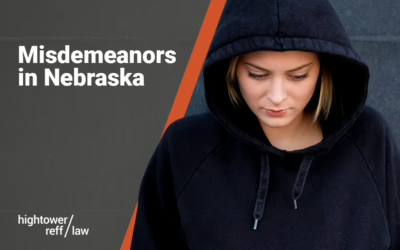 A felony warrant turns your world upside down. Not only are your freedom and your future on the line – if it’s your first arrest, you’ll have no idea what to expect. This series will give you the basic information you’ll want to know if you or a loved one is facing a criminal charge in Nebraska.
A felony warrant turns your world upside down. Not only are your freedom and your future on the line – if it’s your first arrest, you’ll have no idea what to expect. This series will give you the basic information you’ll want to know if you or a loved one is facing a criminal charge in Nebraska.
In Part I , we covered your options once you learn of the warrant and what happens once you’re arrested. Part II covered the nitty gritty of plea bargains.
Now, in Part III, we shed some light on what happens between your arrest and trial.
The Waiting is the Hardest Part
If you don’t reach a plea, be prepared to wait a while for you trial. Because of busy courts and legal wrangling, it can take a year or more for a felony case to reach trial in Douglas County, Nebraska.
A lot of preparation needs to happen before a felony trial, which also adds to the wait. Most of the work on your case, in fact, is done before your trial even starts. Some of the work occurs right at the start of the case, so your attorney can try to get your case dismissed or pled down right off the bat. Attorneys for both sides want to know the facts of your case inside and out and put together a game plan both before and during your trial.
To avoid surprises, lawyers on both sides ask questions of witnesses and get documents, physical objects and photos that the other side plans to introduce to the court to support their side of the case. Your lawyer may conduct an independent investigation by talking to experts, interviewing witnesses, subpoenaing documents and even visiting the scene of the alleged crime. While much of this is done at the very beginning of the case, the work continues to the day of trial; and can take months.
Lawyers also make sure they know the current law that applies to your case before trial starts. Unlike T.V. lawyers, real attorneys don’t carry a catalog of statutes and cases in their heads to recite on demand. Most know the most important ones but the law is huge and changes frequently. That means a lot of pre-trial research and studying so the lawyers know their stuff before they walk into the courtroom.
Magic Evidence: Now You See It; Now the Jury Doesn’t
What evidence the jury sees during the trial and the instructions the judge gives them are crucial to your case. Your lawyer will try to find good reasons under the law to keep the evidence that hurts your case out of the trial through procedural motions.
Additionally, your lawyer will try to convince the judge to use jury instructions that are most favorable to you, while the prosecuting attorney will try to get the judge to use those that are most favorable to a conviction.
Settling On the Courthouse Steps
All the months of preparation and hard work don’t always end in trial. Sometimes you reach a plea agreement on the day of trial — known as settling “on the courthouse steps.” If that happens, your lawyer’s preparation (and your legal expense) was not wasted. The clarity both sides gained through that preparation and legal wrangling most likely led to the prosecutor’s decision to offer a plea and your decision to accept it.
Get Help Early
The best thing you can do if you are accused of a felony (or any crime) is to get experienced legal help from the beginning. My power to help you as a lawyer can be lessened if my client has done something to damage his or her case before I get involved.
If you need help with a felony or other criminal matter, contact Hightower Reff online, or call us at 402-932-9550.
Next Time…
Watch for Part IV of our felony arrest series: Criminal Sentencing – Determining the Time You’ll do.
This article should not be construed as legal advice. Situations are different and it’s impossible to provide legal advice for every situation without knowing the individual facts.



